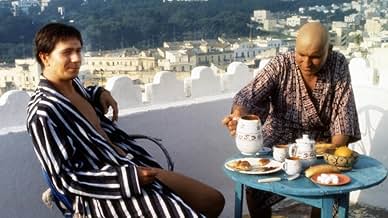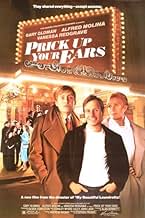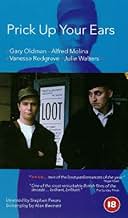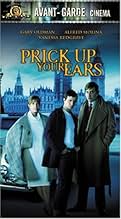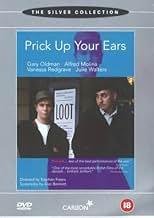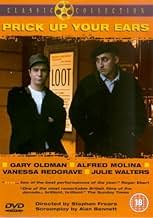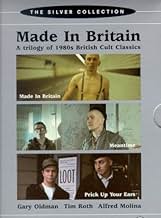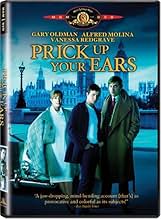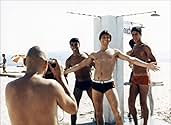Füge eine Handlung in deiner Sprache hinzuBiographer John Lahr is writing a book about playwright Joe Orton. Joe and Kenneth meet at drama school and live together for ten years as lovers and collaborators. Both want to be writers, ... Alles lesenBiographer John Lahr is writing a book about playwright Joe Orton. Joe and Kenneth meet at drama school and live together for ten years as lovers and collaborators. Both want to be writers, but only one of them is successful.Biographer John Lahr is writing a book about playwright Joe Orton. Joe and Kenneth meet at drama school and live together for ten years as lovers and collaborators. Both want to be writers, but only one of them is successful.
- Regie
- Drehbuch
- Hauptbesetzung
- Nominiert für 3 BAFTA Awards
- 5 Gewinne & 8 Nominierungen insgesamt
Empfohlene Bewertungen
Frears depicts the relationship quite sensibly. There is almost always a conflict or a disagreement in Orton and Halliwell's sequences but the love is always apparent. While Kenneth's insecurity worsens as Joe climbs every step up towards success, Joe always stands by him. The viewer is also given brief glimpses of Joe's relationship with his mother, sister and confidant Peggy. The depiction of the 60's gay culture is also intriguing.
The execution isn't first rate as the cinematography is flat and the editing leaves a lot to be desired. The pacing is very slow. The lighting could have used some improvement.
The acting is superb. Gary Oldman is spellbinding as Joe Orton. Even though he is more commonly known for his villainous roles, movies like these prove what a versatile actor he is. Alfred Molina is brilliant as Kenneth. A foxy Julie Walters makes her presence felt in a limited role. Vanessa Redgrave is remarkable in a brief but memorable role.
'Prick Up Your Ears' is an interesting psychological character study and true crime drama. In addition to the wonderful performances, the writing is first rate, especially the witty dialogues loaded with humour. The movie ends on a note of leaving the viewer to wonder what would have become of Orton's life had he still lived. Here was a man who had everything going for him...except one thing that ended his life.
This is a marvelous movie, groundbreaking when it was made, about an author and the authors life-partner who were breaking new ground themselves in their day. Everything about this movie is worth seeing. The story presented, the acting, the sets, the locations. Everything. In fact, it reaches far enough into so many different things about writing and movie making and gays and society and relationships and life and death itself, and it does it so well, that one can reasonably say that if you're a student of film this is a movie that should belong on your list of movies to see and study along the way to making your own movies. And if you're a person who loves good movies, this is also required viewing. And if you're gay, well, it will thrill you to see this movie for so many reasons that only if you're gay would you really kind of understand. And if you're just somebody who wants to pass some time watching a minor cinema masterpiece that has stood the test of time, here is one for you to watch, enjoy and be educated by too. Its just a part of who we were. I miss poor Joe and Kenneth.
Joe Orton whose work I'd like to see and is curiously unavailable is played by Gary Oldman and we see him as a young writer befriended and mentored by Kenneth Halliwell who is older and played by Alfred Molina. Williams says that in his opinion there is no doubt the influence that Halliwell had on Orton's work. But they were two very different types of personality and probably were fated to come apart. Especially when Halliwell who mentored Orton was not finding any success with his own writing. In the end it destroyed them.
Great Britain had some strict sodomy laws as Oscar Wilde was living testimony to. Gay artists however got different treatments depending on who their patrons were. Oscar Wilde and the Orton/Halliwell duo in their respective generations were treated one way. But Noel Coward moved at the highest levels of British society and he had a Teflon like immunity from what befell the other three.
The film is told in flashback with Vanessa Redgrave as Orton's agent telling his biographer Wallace Shawn what the two were about individually and separately. Both Oldman and Molina were brilliant.
I can't help thinking that if they could have been traditionally married back then, they could also have been traditionally divorced when the love faded. That certainly would have been better all around.
But then we would not have had this fascinating tragedy.
The film is quite interesting in what it leaves out - anyone who has read Orton's diaries will know that "the latter part" is rather underplayed here. Also sadly missed is "Mrs Edna Welthorpe" an alter ego of Joe's who would write to newspapers denouncing his plays as filth - a rather cunning way of securing free advertising. A very interesting telephone conversation with Brian Epstein "...one of the boys is happily married..." plays with what we now know about Epstein and Lennon in a beautifully understated way.
Orton and Halliwell's relationship is counterpointed in the film by "John Lahr"'s own marriage (Wallace Shawn is great here too, as always) as Lahr's researching of his biography acts as a framing device for Orton's story. As others have commented, the dynamic of the central relationship rings horribly true to anyone who has been in a halfway similar situation.
It's interesting to speculate on what would have become of Orton had he lived. Time has dimmed the shock value of his plays to the point where they will probably never have the same effect, and despite various rumours (the Sex Pistols?) no-one has picked up the Beatles script, probably for the same reason. Live fast, die young, leave a good looking corpse? Perhaps.
The screenplay, by Alan Bennett, is based on critic John Lahr's biography of Orton. Bennett makes the writing of the biography part of the story, and briefly tries to parallel the relationship of Lahr and his wife Andrea (played by Wallace Shawn and Lindsay Duncan), but I'm not sure that it helps the film much. Splitting the story's focus in its early sections removes us from Orton himself. That's who we want to stay with. The only real benefit the Lahr section gives us is one wonderful scene between Ms Duncan and the great Joan Sanderson as her hyper-middle class mother, decoding shorthand sections of Orton's diary to reveal highly salacious behaviour. Ms Sanderson's deadpan performance, enthusiastically uncovering Orton's meaning while remaining steadfastly unshocked, is one of the highlights of the film for me.
There are a dozen or so cameos from other wondrous actors, mostly known for their theatre work -- Margaret Tyzack, John Moffatt, Julie Legrand, Selina Cadell -- as well as substantial support from Francis Barber and Janet Dale as, respectively, Orton's warm-hearted sister and eccentric landlady.
Ultimately, the film rests on the shoulders of the central trio: Orton, Halliwell and Orton's agent, the redoubtable Peggy Ramsay. She is played by Vanessa Redgrave in a glowing performance, that helps to hold the disparate parts of the film together.
Molina's work I've already praised. So we're back to Gary Oldman, who is absolutely brilliant as Orton. What Oldman is able to do is to accept, rather than explain, his characters. He thinks it's OK not to make them totally knowable, and he's right.
Director Stephen Frears is equally difficult to pigeon-hole. He favours realism on the one hand, but on the other he is capable of pulling off highly-charged scenes - like the orgy in a public lavatory -- which might floor less gifted artists.
All in all, an entertaining and informative film, not without its flaws. In particular, its depiction of gay men's lives in the late fifties and early sixties is interestingly honest.
Wusstest du schon
- WissenswertesAs well as being an actor, Wallace Shawn (John Lahr) is an acclaimed playwright and screenwriter. Until her 1991 death, his theatrical agent was Margaret Ramsay, who was also Joe Orton's agent, and is portrayed in this movie by Dame Vanessa Redgrave.
- PatzerWhen Joe's agent first meets him in 1964, she asks him how he's been supporting himself. He tells her he's on public assistance, getting £3.10 per week. New pence weren't introduced until 1971. However, in the pre-decimal era, "Three pounds ten" would have been understood as "Three pounds and ten shillings", the present-day equivalent being £3.50. For example, "Maggie Mae", recorded by the Beatles in 1969 but based on a much older traditional song, includes the line "Two pounds ten a week, that was my pay."
- Zitate
[Halliwell puts his hand on Orton's leg. Orton brushes it off]
Joe Orton: No. Have a wank.
Kenneth Halliwell: Have a wank? Have a wank? I can't just have a wank. I need three days' notice to have a wank. You can just stand there and do it. Me, it's like organizing D-Day. Forces have to be assembled, magazines bought, the past dredged for some suitably unsavoury episode, the dog-eared thought of which can still produce a faint flicker of desire! Have a wank, it'd be easier to raise the Titanic.
Top-Auswahl
- How long is Prick Up Your Ears?Powered by Alexa
Details
- Erscheinungsdatum
- Herkunftsland
- Sprache
- Auch bekannt als
- Prick Up Your Ears
- Drehorte
- Produktionsfirmen
- Weitere beteiligte Unternehmen bei IMDbPro anzeigen
Box Office
- Bruttoertrag in den USA und Kanada
- 1.654.743 $
- Eröffnungswochenende in den USA und in Kanada
- 38.643 $
- 19. Apr. 1987
- Weltweiter Bruttoertrag
- 1.672.927 $


